danbricklin.com/log
|
||
|
|
Starting September 14, 2001
L'Shanah Tovah -- Happy New Year, What it feels like to be stuck out of town, The next couple of days in California, After the tragedy, The Internet is now a dominant tool for regular people
14-17Sep01
2001_09_14.htm
|
|
Monday, September 17, 2001
L'Shanah Tovah -- Happy New Year
The Jewish New Year starts tonight. May you and the whole world be inscribed for a good, peaceful, healthy, and productive year.
What it feels like to be stuck out of town
The tragedy on Tuesday affected people in different ways. I realized that those of us stranded by the cutoff of air travel were an interesting case to examine. I know that those people who weren't in that situation may not understand what it was like. Because not being understood was part of the pain, it would be helpful to describe it.
Having lived through a devastating family tragedy about 10 years ago (an awful car accident that suddenly left my uncle dead, my father with a severe brain injury and in a coma for over two months, my aunt with broken bones all over, and my mother -- the least hurt -- with a broken neck) I understand a small bit of what it's like to a family when they are directly hit with a sudden, senseless loss. The thought of having that at the same time as thousands of others, and destruction to your city or place of work, all by people who hate your way of life, is pretty mind boggling. Not only do you have the private hurt, you also have the public outrage and sense of hopelessness, and, on top of it all, the physical devastation makes simple things like burying the dead impossible. Watching TV, I keep identifying with those people. It was horrible.
What it took me a while to understand was the special plight of those that were stranded traveling (of which I was one). There were hundreds of thousands of us, with millions waiting for us to get home all over the world. It seems so trivial compared to the other things that went on. After all, at least we're alive and well. We're just inconvenienced. But actually it was more than that emotionally. We were not in familiar surroundings. The main source of familiar companionship when traveling, the TV, was a constant replaying of the tragedy and its aftermath, like a bad dream over and over. We were forced to watch it constantly in search of not just the information all of the world looked for, but also clues to when and how we could get home. A large part of our job became figuring out "what next" for getting home, at the same time as trying to do our "regular" job somehow (for which we were now late). It was especially long for people going to Boston, whose airport stayed closed much longer than others, and those out of the country. While the people who were at their homes could decide how much to go about their regular routines, we had to do something new and uncertain and do it now in addition to everything else. We had to wait for hours on hold, listening to those "your call in important to us..." messages, only to hear that yet another way home was canceled and that they weren't sure if the next option would work. You knew the airline people were all trying the best they could, so you couldn't take out your frustration on them. Calls home brought pleas for you to return home as soon as possible, but to do it as safely as possible. Were you trying hard enough? Should you spend much more money and try other airlines? Who would pay? Should you drive 2,700 miles? What's best? All the while, in the back and middle of your mind was the tragedy, that awful feeling about what happened. What should you do about that? But you had to think about yourself, too, or else you'd never get home. And hotels cost money, the meter is ticking. It was all so frustrating.
Eating breakfast the other day in the hotel restaurant, I heard a song on the PA system that I liked and realized that another thing missing in my life holed up on the road was music. CNN and Peter Jennings are not music, they are not a comforting emotion. The music on hold was too out of place. If you didn't bring your comforting music with you, you were out of luck. No loved ones to hug, no familiar places to visit. (That's one reason I stayed in San Francisco and kept a car. I had friends and relatives. The landscape was somewhat familiar to me. Seeing my cousin and Larry and his family helped a lot. It must be so much worse for those stuck in totally unfamiliar places.)
This frustration for those who were stranded was just another way this tragedy hit people. There are many levels of being directly and indirectly affected, and we'll need to look at them all to understand how the country (and world) are affected.
The next couple of days in California
I'm starting to write entry this Saturday night as I wait to get on the 10:00 pm red-eye to Boston from San Francisco. Finally, it looks like I'm really going back home.
The last few days have been interesting. I continued to live out of a hotel near the airport. I kept my rental car so I could get around. After I posted the item below very late Thursday night, I spent the first several hours of Friday trying to find alternative routes home. Boston's Logan airport continued to be closed. I got all the details in place to fly to Newark, NJ, Sunday (the first flight I could book), and then take a cab to relatives in Connecticut who were driving the next day to Boston. Totally burnt out from hours dealing with uncertain travel, I decided it was time to get out a bit and see other people again. Looking in my Palm III for numbers in the Bay Area, I found my friend Larry Magid's number. I called him up. He was going to do his daily report on CBS radio from his home studio, and then go on a bike ride for exercise. He invited me along. He had an extra bike and helmet. Great! Stopping for a late lunch on the way, I called Bob Frankston. He had just heard that Logan airport was going to open at 5:00 am Saturday. Checking the United Airlines web site, he saw tickets available on the red-eye that night. Back to dealing with travel. I quickly got over to Larry's and called United. (I didn't have enough cellphone battery to do the dial/hangup/dial routine to reach the very busy reservations line.) When I finally got through, all that was left was the last seat on the Sunday night red-eye. I took it. Yes! I finally had a confirmed seat on a plane that would probably make it back to Boston. It felt liberating. Larry and I then went off on an hour bike ride along the Bay and through some streets of Palo Alto. Wow, did that ever feel good. Here are two pictures:
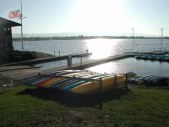 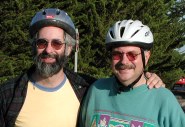 A lake along the way next to the Bay; me and Larry posing for a self-timer picture: It felt good to do something nice with someone else in a beautiful place, and anyway, you smile for the camera automatically in such shots -- the smiles are not reflective of the way we felt for the last few days
I had dinner with Larry and his family, then stayed for a few more hours talking with Larry. The next morning my travel agent found that the Saturday night red-eye opened up for a few minutes and got me on. (More hours spent on travel work.) I stopped over at Larry's once more for another ride along the Bay, drove back up to the airport and returned the car, checked in a few hours early (it wasn't very crowded, and after traveling to Europe and the Middle East, I'm used to security), made a few calls to tell people it looked like I was actually going to get out, and then started typing this. I had just enough time to type until here before boarding. The guy in front of me in the security line had left a little pocket knife in his carry-on. They caught it and made him take it back to the check-in counter.
(Writing this Sunday night:) What really struck me when first sitting on the plane was the view from my seat up to the front. With the interior lights on, it was so bright, clean, and sterile. Yet in my mind, all I could see from seat 7D looking towards the cockpit was what it must have looked like when people who would have been in front of me started killing other passengers and taking over the plane. It was such a horrible contrast. Mercifully, they turned off the cabin lights so we could sleep. I said a prayer, and then slept for about 4 hours.
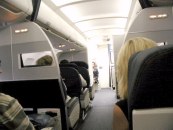 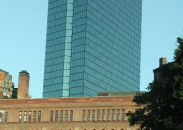 A view of up the aisle of my plane into First Class after we landed (it was much brighter before we took off), the Hancock Building when driving home
When we came in for a landing at 6:15 am, Boston looked so good and friendly from the air, like never before. Driving home, seeing the "Big Dig" construction going on, a vibrant sky line, and especially the towering John Hancock Building, was very reassuring for some reason. It just felt so good to be reminded of rebuilding, the ongoing renovation of a big city, and the fact that so much of our country was still intact.
Friday, September 14, 2001
After the tragedy
I've been feeling unable to post anything here since the horrible events of Tuesday. I've been stuck in hotel rooms in San Francisco area, with the TV showing mainly awful images ever since I saw the first one minutes after the first plane hit (I was awake for a conference call with people on the East Coast).
I don't see this particular web log as a real source of news (or a flow of links to news) for people, though I appreciate those that do, like Dave Winer. I also don't see it as a place for me to tell the world what to do in areas I don't have expertise. I do, though, find it the closest thing to a personal diary, and I know I'll look back on it over the years (as I have so far), so please indulge me while I record some personal feelings and events during a time that makes your personal problems seem so insignificant.
Having just flown in from Boston on a United flight the day before, the horror really struck home. "There, but for fortune, go you or I", as Phil Ochs used to sing. I just felt so bad for all those poor souls who happened to be at the wrong place at the wrong time, trying not to keep imagining how horribly awful it had been for them. Being unable to get home emphasized the helplessness. It would feel much better to be in New York or Washington and be able to do something to help, or home to comfort friends and family.
I did show up to give a speech on Tuesday morning to a very somber, cut-short conference on Community hosted by Basex. I gave the talk I planned, which I felt quite comfortable with given the events that were unfolding: I talked about how important other people find their relationships with their loved ones, and how even the most mundane parts of it were meaningful to the people involved. (For example, see my "What will people pay for?" essay.) As I had planned, I read from Jane Jacob's classic book, the ironically named The Death and Life of Great American Cities (written 40 years ago), about how we get a sense of community through interactions together on the sidewalks and in the stores of city neighborhoods like Soho NYC . I also read from The Little Prince about how special bonds of responsibility are formed between people and that "it is only with the heart that one can see rightly." I then went back to the hotel and got to see those bonds and sense of community played out over and over again on TV in very real life.
I talked to friends and relatives on the phone. My cousin Eyal in Israel sent his sympathies, an interesting switch. Friends and relatives in Japan had checked in to see if those of us in the States were OK. One friend I checked in with I knew worked in a building a mile away from the WTC. He had seen most of what happened through his conference room window. My dear friend Bob Frankston's mother had died over the weekend. He had to help arrange a funeral that he attended Tuesday in New York City, while not knowing if relatives who were flying in were OK, and then drive back to Boston that night. I had felt badly enough about missing it to fulfill my commitments to speak, now I couldn't get back to see him afterwards. I felt in shock.
The conference where I was to give a speech Wednesday in Chicago was canceled. (I was going to mention some of the work of InContext Enterprises. Yesterday, their CEO, my friend Karen Holtzblatt, posted something I liked on their web site about how to react to the tragedy.) I was stuck in California and couldn't go to the conference, anyway. I didn't feel up to talking to most anybody whose life I wasn't a part of. I felt I'd just be intruding. Luckily, I have a first cousin who works a few blocks from my hotel, and we went out to lunch together. I had dinner with a co-worker who was also stranded, but staying at different hotels. Between seeing the two I wanted to experience something different, something natural and timeless, as a relief. I drove down to Sutro Heights Park, a place on the Pacific Ocean I had run into the day before when I made a wrong turn coming back from my talk. It has an ocean and rocks and birds. There was a lone fisherman against the pounding surf. It helped to watch for a while. I called a few relatives on my cellphone to share what I saw and promised pictures:
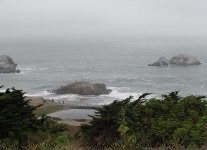  Seal Rocks viewed from the park above, and a closeup of one of the rocks with the beautiful birds as viewed through one of those telescopes you put a quarter in
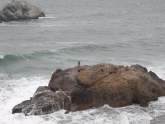 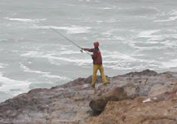 Two views of a fisherman on the rock in front
Thursday, I decided I needed to get back to the world. I spent lots of time writing a new essay, inspired by the rush to the Internet on Tuesday. Getting through writer's block was helpful. I think it's important to keep things going in our society, and not let the terrorists slow us down, even if we still have to remember the tragedy and do what we can to recover from it. I want the terrorists to die in vain in the end, not the innocent victims.
After posting the essay, I started writing this piece, not knowing where it would go. It's really helped me get out of the shock and start sorting things out and get back to productive work. To my regular readers (a few of whom are close relatives...), thanks for being a community out there that I feel enough connection with to express this.
The Internet is now a dominant tool for regular people
I think an interesting thing to look for are tools that are so general purpose and useful that we can logically (and successfully) find ways to use them for a wide variety of important things, often ones not foreseen by their creators, and sometimes in lieu of using alternative, "better" tools. Such tools often become very popular. I think there are two important applications for the Internet that have become such tools for regular people: Communications with people we know, and searching for information. They are the "hammer" we find to use on many "nails".
These two uses have proven to be ones people will pay for.
|
||
|
© Copyright 1999-2018 by Daniel Bricklin
All Rights Reserved.
|
||